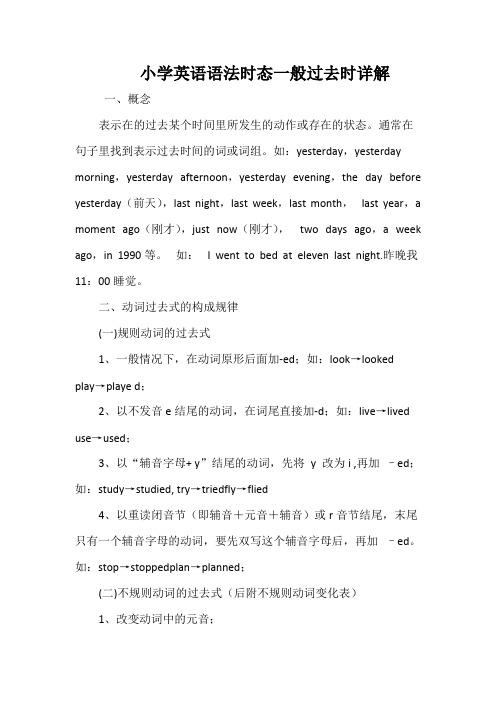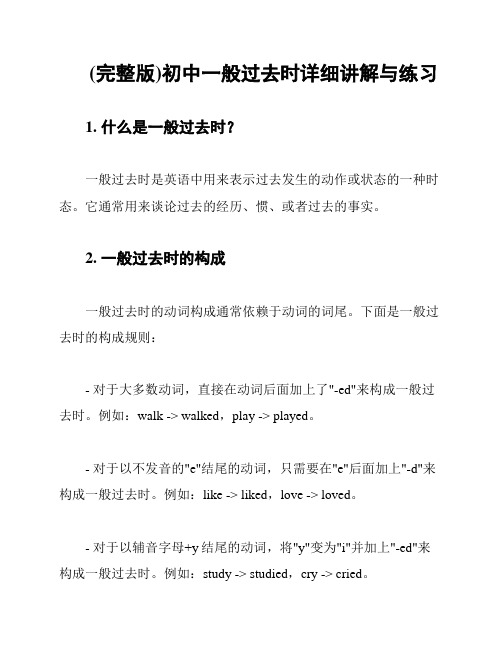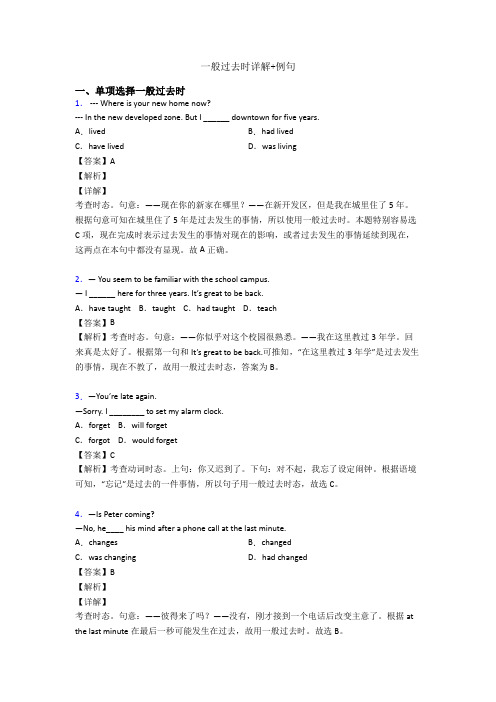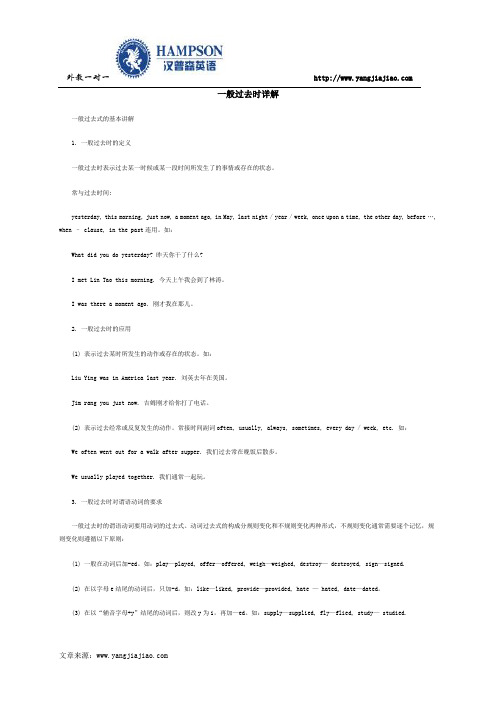一般过去时详解(重点)
- 格式:doc
- 大小:43.50 KB
- 文档页数:8

小学英语语法时态一般过去时详解一、概念表示在的过去某个时间里所发生的动作或存在的状态。
通常在句子里找到表示过去时间的词或词组。
如:yesterday,yesterday morning,yesterday afternoon,yesterday evening,the day before yesterday(前天),last night,last week,last month,last year,a moment ago(刚才),just now(刚才),two days ago,a week ago,in 1990等。
如:I went to bed at eleven last night.昨晚我11:00睡觉。
二、动词过去式的构成规律(一)规则动词的过去式1、一般情况下,在动词原形后面加-ed;如:look→looked play→playe d;2、以不发音e结尾的动词,在词尾直接加-d;如:live→lived use→used;3、以“辅音字母+ y”结尾的动词,先将y 改为i ,再加–ed;如:study→studied, try→triedfly→flied4、以重读闭音节(即辅音+元音+辅音)或r音节结尾,末尾只有一个辅音字母的动词,要先双写这个辅音字母后,再加–ed。
如:stop→stoppedplan→planned;(二)不规则动词的过去式(后附不规则动词变化表)1、改变动词中的元音;begin→began drink→drank come→came eat→ate grow→grew run→ran know→knew win→wonspeak→spoketake→took write→wrote get→got2、变词尾的–d 为–t ;build→built lend→lent send→sent spend→spent bend→bent3、与动词原形一样;cut→cut put→put cost→cost hurt→hurt shut→shut4、变-ay 为-aid (少数动词);say→said pay→paid lay→laid5、采用不同词根;sell→sold teach→taught buy→bought6、其他。

一般过去时详解重点一般过去时是英语中用来描述过去发生的动作、经历或状态的时态。
在语法上,一般过去时使用动词的过去式来表示,无论是规则动词还是不规则动词。
一、一般过去时的结构一般过去时的句子结构为:主语 + 动词过去式 + 其他部分。
其中,主语可以是第一、二、三人称的单数或复数形式,动词使用一般过去时的过去式形式。
1. 肯定句结构:主语 + 动词过去式 + ...例如:- She walked to the park.- They played basketball last night.2. 否定句结构:主语 + did not (didn't) + 动词原形 + ...例如:- He did not (didn't) go to the party.- We didn't watch the movie.3. 疑问句结构:Did + 主语 + 动词原形 + ...?例如:- Did you see the accident?- Did they go to the beach?二、一般过去时的用法1. 表示过去发生的具体动作或事件:例如:- I watched a movie yesterday.- They visited their grandparents last summer.2. 表示过去的习惯或常态:例如:- She always played tennis when she was young.- We usually went camping during the summer.3. 与过去的时间状语连用:时间状语可以是具体的时间点、时间段或表示频率的词语。
例如:- She finished her homework yesterday.- We lived in that house for five years.- He often went swimming on weekends.4. 与表示过去的连词连用:表示过去的连词如“when”、“while”、“as soon as”等可以与一般过去时连用,表示过去某一时间点或一段时间内发生的动作。

(完整版)初中一般过去时详细讲解与练习1. 什么是一般过去时?一般过去时是英语中用来表示过去发生的动作或状态的一种时态。
它通常用来谈论过去的经历、惯、或者过去的事实。
2. 一般过去时的构成一般过去时的动词构成通常依赖于动词的词尾。
下面是一般过去时的构成规则:- 对于大多数动词,直接在动词后面加上了"-ed"来构成一般过去时。
例如:walk -> walked,play -> played。
- 对于以不发音的"e"结尾的动词,只需要在"e"后面加上"-d"来构成一般过去时。
例如:like -> liked,love -> loved。
- 对于以辅音字母+y结尾的动词,将"y"变为"i"并加上"-ed"来构成一般过去时。
例如:study -> studied,cry -> cried。
- 部分动词的一般过去时需要进行不规则变化。
例如:go -> went,eat -> ate。
3. 一般过去时的用法一般过去时通常用来描述以下情况:- 过去发生的动作:I walked to school yesterday.- 过去的经历:He lived in London for five years.- 过去的事实:She was a teacher in the past.4. 一般过去时的句型练下面是一些练,帮助加深对一般过去时的理解和运用:1. 请用一般过去时填空:Yesterday, I ________ (watch) a movie at home.2. 完成句子:He _____ (visit) his grandparents last summer.3. 改写句子,使用一般过去时:I read a book yesterday. (改为否定句)4. 改写句子,使用一般过去时:They played basketball in the park. (改为疑问句)5. 总结一般过去时是用来表示过去发生的动作或状态的一种时态。

一般过去时详解+例句一、单项选择一般过去时1. --- Where is your new home now?--- In the new developed zone. But I ______ downtown for five years.A.lived B.had livedC.have lived D.was living【答案】A【解析】【详解】考查时态。
句意:——现在你的新家在哪里?——在新开发区,但是我在城里住了5年。
根据句意可知在城里住了5年是过去发生的事情,所以使用一般过去时。
本题特别容易选C项,现在完成时表示过去发生的事情对现在的影响,或者过去发生的事情延续到现在,这两点在本句中都没有显现。
故A正确。
2.— You seem to be familiar with the school campus.—I ______ here for three years. It’s great to be back.A.have taught B.taught C.had taught D.teach【答案】B【解析】考查时态。
句意:——你似乎对这个校园很熟悉。
——我在这里教过3年学。
回来真是太好了。
根据第一句和It’s great to be back.可推知,“在这里教过3年学”是过去发生的事情,现在不教了,故用一般过去时态,答案为B。
3.—You’re late again.—Sorry. I ________ to set my alarm clock.A.forget B.will forgetC.forgot D.would forget【答案】C【解析】考查动词时态。
上句:你又迟到了。
下句:对不起,我忘了设定闹钟。
根据语境可知,“忘记”是过去的一件事情,所以句子用一般过去时态,故选C。
4.—Is Peter coming?—No, he____ his mind after a phone call at the last minute.A.changes B.changedC.was changing D.had changed【答案】B【解析】【详解】考查时态。

外教一对一一般过去时详解一般过去式的基本讲解1. 一般过去时的定义一般过去时表示过去某一时候或某一段时间所发生了的事情或存在的状态。
常与过去时间:yesterday, this morning, just now, a moment ago, in May, last night / year / week, once upon a time, the other day, before …, when – clause, in the past连用。
如:What did you do yesterday? 昨天你干了什么?I met Lin Tao this morning. 今天上午我会到了林涛。
I was there a moment ago. 刚才我在那儿。
2. 一般过去时的应用(1) 表示过去某时所发生的动作或存在的状态。
如:Liu Ying was in America last year. 刘英去年在美国。
Jim rang you just now. 吉姆刚才给你打了电话。
(2) 表示过去经常或反复发生的动作。
常接时间副词often, usually, always, sometimes, every day / week, etc. 如:We often went out for a walk after supper. 我们过去常在晚饭后散步。
We usually played together. 我们通常一起玩。
3. 一般过去时对谓语动词的要求一般过去时的谓语动词要用动词的过去式。
动词过去式的构成分规则变化和不规则变化两种形式,不规则变化通常需要逐个记忆,规则变化则遵循以下原则:(1) 一般在动词后加-ed。
如:play—played, offer—offered, weigh—weighed, destroy— destroyed, sign—signed.(2) 在以字母e结尾的动词后,只加-d。

一般过去式The past Indefinite tense一、概念:1、过去的状态:肯定句:主语+ was/were+(形容词、名词、介词短语)。
否定形式:主语+ was/were +not +(形容词、名词、介词短语)。
一般疑问句形式:was/were+主语+(形容词、名词、介词短语)Yes,主语+was/were. No,主语+wasn’t/weren’t.特殊疑问句句式:疑问词+ was/were+主语+(形容词、名词、介词短语)* 单数三人成和I 用,was;复数人称和you 用were。
2、过去习惯性、经常性的动作、行为:肯定句:主语+ V过去式 +宾语 +时间状语、地点状语。
否定形式:主语+ did +not +宾语 +时间状语、地点状语。
一般疑问句形式:Did +主语 + V原型 +宾语 +时间状语/地点状语Yes,主语+did. No,主语+didn’t特殊疑问句句式:疑问词+Did +主语 + V原型 +宾语 +时间状语/地点状语二、四种时间状语:① yesterday及相关短语。
例如:yesterday morning/afternoon/evening ,the day before yesterday,② “last+ 时间状语”构成的短语。
例如:last Monday .../last night/month/spring/year 昨晚/上个月/去年春天/去年。
③ “一段时间+ago”组成的短语。
例如:three days ago 三天以前 four years ago四年以前。
④ “介词+ 时间名词”组成的短语。
例如:in 1999 在1999年;on the morning of December 25th 在12月25号早上。
还有一些过去时常用的时间状语:just now, at the age of 5, one day, long ago, once upon a time(很久以前), at thattime,before, a few days ago, when,the other day(前几天),When I was 8 years old (当我八岁时…),etc.三、过去时用法:① 表示在过去某个时间发生的动作或情况。
一般过去时知识点详解(初中英语专项复习)一般过去时的构成:一般过去时用动词的过去式表示。
Last week Tom made a model plane with his friend Jack. 上周汤姆和他的朋友杰克做了一个飞机模型。
Tom was at home yesterday. 汤姆昨天在家。
一般过去时的用法:(1)表示过去经常发生的动作或者过去经常存在的状态。
常与表示过去的时间状语yesterday,just now,a moment ago,last week/ year/ night,in 1985,in those days,when I was at middle school等连用。
例如:They went to college last year. 他们是去年上大学。
We had a good time in the park yesterday. 我们昨天在公园玩得很高兴。
(2)表示过去接连发生的一系列动作。
例如:We played football first,then went boating and fishing,,and at last had a picnic there. 我们先踢足球,然后去划船、钓鱼。
最后我们在那里野餐。
注意:(1)表示过去经常或反复的动作,而现在却不这样做了,也可以用used to +动词原形来表示。
例如:I used to get up very late. 我过去总是起床很晚。
(2)如果主句的谓语动词是现在完成时,since引导的时间状语从句用一般过去时。
例如:We have made a lot of friends since we came here. 自从我们来到这里以来已经交了很多的朋友。
(3)谈论某人的出生日期经常用一般过去时。
一般过去时精讲一、一般过去时表示的意义:1、表示过去某个时间发生的动作或存在的状态,常和表示过去的时间状语连用,如yesterday, last night, in 1990, two days ago 等。
如:I got up at 6:30 yesterday . 我昨天6:30起床。
【动作】She was at home last night .. 她昨天晚上在家。
【状态】2、表示过去经常或反复发生的动作,常和often, always 等表示频度的时间状语连用。
如:He always went to work by bus last year . 去年他一直乘公共汽车上班。
二、一般过去时的构成:㈠ 含有be 动词的一般过去时的主结构:【常用的四种结构】1、肯定句:主语+was/were+表语。
例如:His father was very busy last week. 他父亲上周很忙。
They were at home last night.. 他们昨天晚上在家。
2、否定句:主语+was/were+not+表语。
例如:His father wasnot very busy last week. 他父亲上周不是很忙。
They were not at home last night.. 他们昨天晚上不在家。
3、一般疑问句:Was/Were+主语+表语。
例如:Was his father very busy last week. 他父亲上周很忙。
他们昨天晚上在家吗?+was/were+主语+其它?例如:How was his father last week? 他父亲上周怎么样?Where were they last night? 他们昨天晚上在哪?【注意】①主语为第一人称单数或第三人称单数时,用was,其它人称一律用were.②变成否定句时,只需在was/were 后直接加not 就行了。
在高中英语学习中,了解和掌握一般过去时是非常重要的。
一般过去时用于描述过去发生的动作、状态或习惯。
本文将详细介绍一般过去时,以帮助学生更好地理解和运用这一时态。
一、一般过去时的用法:一般过去时用于以下情况:1. 过去发生的动作:表示在过去某个时间发生的动作或事件。
例句:I watched a movie last night.(昨晚我看了一部电影。
)2. 过去的状态:描述过去某一时刻的状态或条件。
例句:She was happy yesterday.(昨天她很开心。
)3. 过去的习惯:表示过去经常或习惯性发生的动作。
例句:They always went for a walk after dinner.(他们过去经常在晚饭后散步。
)二、一般过去时的构成:一般过去时的肯定句由主语加动词的过去式构成,否定句和疑问句需要使用助动词did。
1. 肯定句的构成:主语+ 动词过去式+ 其他成分例句:He played soccer with his friends yesterday.(昨天他和他的朋友们踢足球。
)2. 否定句的构成:主语+ did not + 动词原形+ 其他成分例句:She did not go to the party last night.(她昨晚没有去参加派对。
)3. 疑问句的构成:Did + 主语+ 动词原形+ 其他成分?例句:Did you finish your homework?(你完成作业了吗?)三、一般过去时的常见例句:1. I visited my grandparents last summer vacation.(去年暑假我拜访了我的爷爷奶奶。
)2. He studied English for three hours yesterday.(昨天他学了三个小时的英语。
)3. We didn't see each other for a long time.(我们很长时间没有见面了。
一、一般过去时的概念:一般过去时用来表示过去某一时间发生的动作或存在的状态以及过去习惯性、反复性的动作。
谓语动词要用动词的过去式,常和表示过去的时间状语连用,如yesterday昨天、last night昨晚、last week上周、last year去年,等。
二、一般过去时的结构:(可分三类不同的结构)1.Be动词的一般过去时在没有实义动词的句子中使用be动词,am is的过去式为was;are的过去式为were肯定句式:主语+be(was,were)+其它.否定句式:主语+be(was,were)+not+其它.一般疑问句:Be(was,were)+主语+其它?注:在这种构成中,be动词有人称和数的变化,即要根据主语选用was/were。
Be动词分为单数和复数,was是表示单数,were是表示复数。
2.实义动词的一般过去时态肯定句要使用动词的过去式,否定句和疑问句要使用助动词do和does的过去式did.肯定句式:主语+动词(过去式)+其它否定句式:主语+didn’t+动词(原形)+其它【did not=didn’t】一般疑问句:Did+主语+动词(原形)+其它【do,does的过去时均为did】?注:did和didn’t是构成一般过去时的助动词,其特点是要在其后跟动词的原形。
3.情态动词的一般过去时态含有情态动词的一般过去时与含有Be动词的一般过去时,是十分相似,请注意观察。
肯定句式:主语+情态动词+其它.否定句式:主语+情态动词+not+其它.一般疑问句:情态动词+主语+其它?注:情态动词的过去式:can→could,may→might,must→must,will-would,should-should.4.特殊疑问句式:特殊疑问词+be过去式+主语+其他?特殊疑问词+情态助动词过去式+主语+动词原形+其他?特殊疑问词+do/does过去式+主语+动词原形+其他?What was your former name?你以前叫什么名字?Why did he late for school last Monday?上星期一他为什么迟到?What could she do twenty years ago?20年前她能做什么?三、一般过去时的判断标志词yesterday,the day before yesterday,last+时间,this morning时间+ago,just now,a moment ago,in+过去的时间.四、规则动词的过去式1.一般情况下,在动词原形后面加-ed。
look→looked play→played start→started visit→visited2.以不发音e结尾的动词,在词尾直接加-d。
live→lived use→used3.以“辅音字母+y”结尾的动词,先将y改为i,再加–ed。
study→studied try→tried fly→flied4.以重读闭音节(即辅音+元音+辅音)或r音节结尾,末尾只有一个辅音字母的动词,要先双写这个辅音字母后,再加–ed。
stop→stopped plan→planned prefer→preferred5.不规则动词的过去式需特殊记忆。
五、一般过去时的基本用法①表示过去某个特定时间发生的动作或存在的状态。
He suddenly fell ill last night.他昨晚突然病倒了。
②表示过去的习惯性或经常发生的动作。
常和often经常,always总是,once a week一周一次,等表示频度的时间状语连用。
She went to the cinema once a month when she was at school.她上学时每个月去看一场电影。
When I was in the countryside,I often walked by the riverside.我在乡下时经常在河边散步。
一般过去时练习题I.请用正确动词形式填空1.He (live) in Wuxi two years ago.2.The cat (eat) a bird last night.3.We (have) a party last Halloween.4.Nancy (pick) up oranges on the farm last week.5.I (make) a model ship with Mike yesterday.6.They (play) chess in the classroom last PE lesson.7.My mother (cook) a nice food last Spring Festival.8.The girls (dance) at the party last night.9.I (watch) a cartoon on Saturday last week.10. ______ you _______ (visit) your relatives last Spring Festival?11. ______ he _______ (fly) a kite on Sunday? Yes, he ______.12. Gao Shan _______ (put) up the picture last night.13. I ____________ (sweep) the floor yesterday.14. What ______ she _______ (find) in the garden last morning?15. Her father _______ (read) a newspaper last night.16. Mike _________________(not go) to bed until 12 o’clock last night.17. I listened but ___________ (hear) nothing.18. How many people ________ (be) there in your class last term?II. 改错题1.How is Jane yesterday? _____________________2.He go to school by bus last week. ____________________________3.He often goes home at 6:00 last month. ____________________________ 4.I can fly kites seven years ago. ______________________________5.Did you saw him just now. ____________________________________三、按要求变换句型。
1. Frank read an interesting book about history. (一般疑问句)_______ Frank _______ an interesting book about history?2. He cleaned his room just now.. (划线提问)What________ he _______?3. Thomas spent RMB 10 on this book. (否定句)Thomas _______ _______ RMB 10 on this book.4. My family went to the beach last week. (划线提问)________ ________ ________ family _______ last week?I.用所给的动词的适当形式填空。
⒈He _____(visit) the Great Wall last year.2.We________(have) a good time yesterday.3.We often _______(go) to school by bus last year.4.I ________(live)in the village when I was a child.5.Mike______(see) a big tiger in the nature park last year.6.Sam_____ (do) the housework yesterday.7.______(do) you _______(enjoy) yourself yesterday?8.______(do)you _________(play) the violin in the artroom yesterday? No, I didn't. I_____(draw)some pictures there.9.. I ______ (eat) a big pizza yesterday.10.There____ (be) many sheep on the farm last year.11. I ______ (watch) a cartoon on Saturday.12. Her father _______ (read) a newspaper last night.13. We _________ to zoo yesterday, we _____ to the park. (go)14. ______ you _______ (visit) your relatives last Spring Festival?15. ______ he _______ (fly) a kite on Sunday? Yes, he ______.一、将下列动词变成过去式。
look_______watch_______like______hope______decide______ plan______stop_______carry______study______play______stay______let______put_______read_______catch _____teach_____-buy______bring______ think ______sit_____write______ drive_______ring______ sink______run______give_______win _______ know ______grow______ throw_______draw _____show_____feel______sleep_______keep_____sweep_____meet_______二、用括号所给动词的适当形式填空。